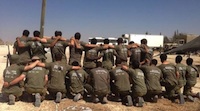 Rabbi Nir Barkin, rabbi of Modiin’s YOZMA congregation shares what it’s like for the parent of a soldier on the front lines of the ongoing conflict in Gaza.
Rabbi Nir Barkin, rabbi of Modiin’s YOZMA congregation shares what it’s like for the parent of a soldier on the front lines of the ongoing conflict in Gaza.
It is Shabbat, and my wife Anat and I are relaxing in lounge chairs in the small backyard of our home. We call it the “Nachlaot garden,” because it’s reminiscent of that Jerusalem neighborhood known for its old-style housing and hidden courtyards. As a former Jerusalemite, it was important to me to imprint something of the flavor of my Jerusalem family home – which had been in Nachlaot since the mid-19th century.
We are thinking of Omri, our middle child, 19 years and two months old, a “mommy’s and daddy’s boy” – or at least that’s how we viewed him until recently. Omri, who just yesterday would finger his “smichi” – an old work shirt of mine – trailing it behind him like a cape, pretending to be Popeye’s son Swee’Pea. Omri, a house kitten who overnight has become a panther.
Now, Omri is a combat soldier in one of Israel’s elite units, fighting in Gaza. We haven’t heard from him in six days, and the worry and anxiety eat away at our souls.
The weekend newspapers lay strewn around us in piles, as in homes everywhere – here in Israel and abroad. This weekend, everything – the news items, endless interpretations, assessments, speculations of “what if” and “maybe,” opinion columns, and feature articles – deals with Operation Protective Edge, which shows no signs of ending.
I think to myself, “I don’t see any light at the end of the tunnel,” but I don’t share my thoughts with Anat, who tries to pass these difficult, suspenseful hours by flipping between news channels and websites. She has created a text messaging group for parents of Omri’s unit, a collective therapy support group of those as helpless as we are.
The exposure of Hamas’ tunnels, the discovery of stores of ammunition directed at Israeli settlements, and the continued rocket-fire leaves me feeling that this is a just and unavoidable war – even given all the evil and horror that war brings. Still, I choke when I hear phrases like “a war for our home” and “an unavoidable war” – not because I doubt that they’re true, but because this is my first as the parent of a combat soldier.
During the Six-Day War, I was eight months old. My father returned from the war suffering from PTS, and later, my parents separated. During the War of Attrition in the late 1960s and early ‘70s, we were living in the North and were constantly bombarded with Katyusha attacks. Terrorists from Lebanon attacked the towns around us: Shamir, Misgav Am, Kiryat Shemona, Ma’alot, and more. The face of evil that I saw as a young child shook the peace and basic fortitude that every child needs to grow.
The Yom Kippur War forced us – second-graders – to spend weeks in a dank, dark bomb shelter, sleeping on wood plank beds surrounded by the smell of the chemical toilets. Our horror was exacerbated when we left the shelter to learn of the deaths of three beloved kibbutz members.
There were more terrorist attacks and the Intifadas, more military operations whose names I’ve repressed. In eleventh grade, I found in my brother’s closet the envelope of the farewell note labeled “To Be Opened if I Don’t Return.” Fortunately, it was never opened, but again, I repressed my feelings and put up another defensive wall in my inner bunker in order to survive.
We have been fighting daily for our survival for more years than we have had a state. A war for our home. An unavoidable war. Truly, there is no other option. Those who study history know this to be true. A hand extended in peace (and mine is extended, despite everything) is no substitute for a watchful eye and eternal caution. Any peaceful solution or resolution will be greeted by me with wary caution. I am suspicious of international friendships – not surprising, given the complicated and conflicted neighborhood in which I was raised.
It’s one thing for Anat and me to have been in a lifelong, continuous struggle to maintain our sanity – as children, adolescents and adults in this country. It’s quite another to have a son fighting at the front. It’s one thing to be a 6-year old child planning your escape from a terrorist who has infiltrated your kibbutz. It’s quite another to think about our son navigating the dark alleys and mazes in Gaza.
We get through the days, but at night, the nightmares cross decades of trauma. They leave us with black circles under our eyes, perpetual difficulty breathing, and a terrible fear of a knock on the door, a Red Code siren, a telephone call notifying us that…
We are impatient to hear the phone ringing with the special ringtone we’ve set for Omri’s calls. We are impatient to hear his beloved voice in real-time, tired and battered but whole in body and soul, saying “Hi, Abba. I’m OK.” We are impatient to learn that the traumas of war that have accompanied us have not been imprinted on his flesh.
With all the modern communications networks, isn’t there a way for us to see Omri here in our garden in our home, lighting the end of the tunnel with an inextinguishable light of hope?
